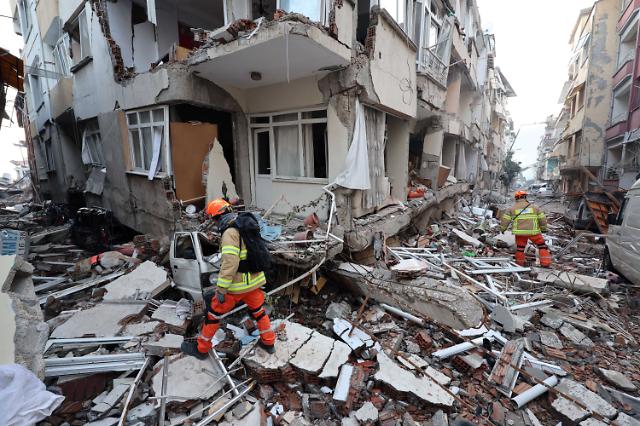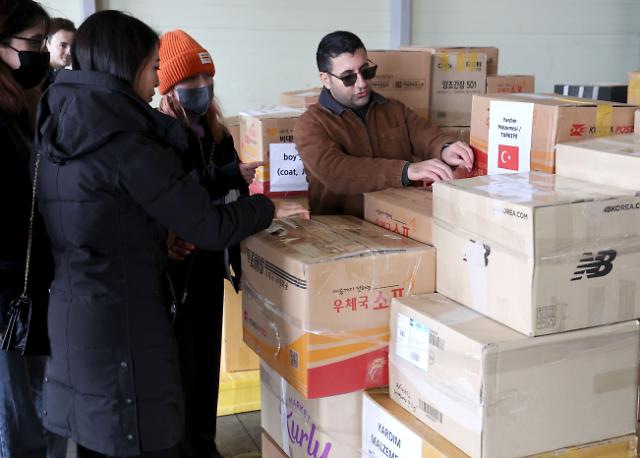
South Korean disaster relief workers conducts search and rescue operation in Antakya, the capital of Turkey's southeastern Hatay province, February 10, four days after the region was devastated by a 7.8 magnitude earthquake. [Yonhap]

[Arthur I. Cyr]
These terrible numbers will continue to grow as relief work proceeds, rescuing the living, attending to the dead.
United States relief and rescue efforts began almost immediately. These encompass nonprofit and volunteer initiatives along with government aid.
The Biden administration is providing $85 million in emergency assistance. Elite highly-trained disaster assistance and response teams of the U.S. Agency for International Development have been working in the hardest hit areas. They have been joined by many other government agencies.
As usual in humanitarian aid around the world, the U.S. military is playing a major role, often little reported.
While these urgent needs are the priority, we should also plan seriously about longer-time implications for U.S. foreign policy. There may be opportunities to reconcile the tense, at times violent relations between Syria and Turkey. Combining heart with head defines leadership.
Over the past two decades, U.S. relations with both Syria and Turkey have been difficult, to some extent understandably. Syria remains a harsh, rigid dictatorship, long ruled by the Assad family. During the Obama administration, our relations became particularly strained. In Turkey, long-term ruler Recep Tayyip Erdogan of Turkey has become autocratic.
President Back Obama gave priority to publicly criticizing the government of Syria and encouraging regime change. The well-intended rhetoric proved extremely counterproductive, predictably. President Jimmy Carter took a similar approach to the world, emphasizing morality over reality.
Fundamental problems with emphasis on human rights above all else regarding Syria is the lack of any tradition of representative government. There are no desirable alternatives to President Bashar al-Assad. The Syria government plays an important role in resisting and defeating violent fundamentalist movements, notably the Islamic State.
Turkey is a pivotal nation, Western in practices but with a Muslim majority. After the revolution in the 1920s led by Mustafa Kemal Ataturk, the government of Turkey became constitutionally secular.
Turkey commands vital sea lanes and trade routes, including the Strait of Bosporus. The nation pursues economic relationships with the states of the former Soviet Union. Moscow’s influence has deteriorated since invading Ukraine.
Historically, Turkey-U.S. cooperation is strongly rooted. Turkey was engaged in Afghanistan, including military command responsibilities. During the first Persian Gulf War, U.S. B-52 bombers were deployed on Turkish soil, a risky move for that government.
Turkey played a vital Allied role during the 1950-53 Korean War; the U.N. military cemetery at the southeaster port city of Busan (formerly Pusan) contains a notably large number of Turkish graves.
This background is of great importance in this unstable region where Turkey-U.S. ties have been badly strained. Ankara rightly angrily opposed the Bush administration’s disastrous 2003 invasion of Iraq.
The U.S. government should do nothing that would appear to be taking any national advantage of the terrible human tragedies unfolding in the wake of the devastating earthquakes. Work should remain focused on humanitarian relief. That is both ethical and smart.
Our military has extraordinary capacities. The Pentagon has enormous assets to supplement and temporarily replace destroyed water and power supplies, and suppliers, provide medical including specialized surgical help, evacuate people injured or at risk of injury.
Syrians, Turks, Americans and others should be assured this is the priority. Longer-term, this aids sensible, effective diplomacy.
Copyright ⓒ Aju Press All rights reserved.



View more comments